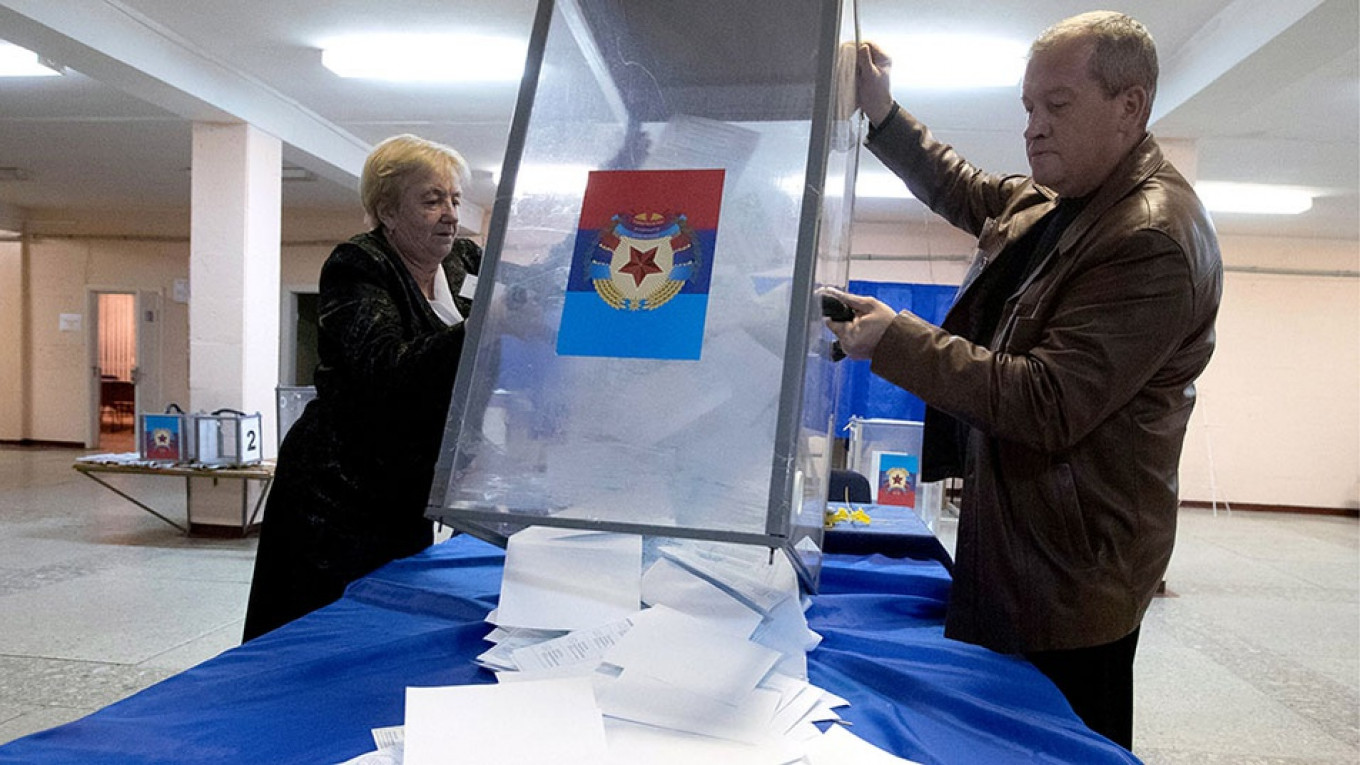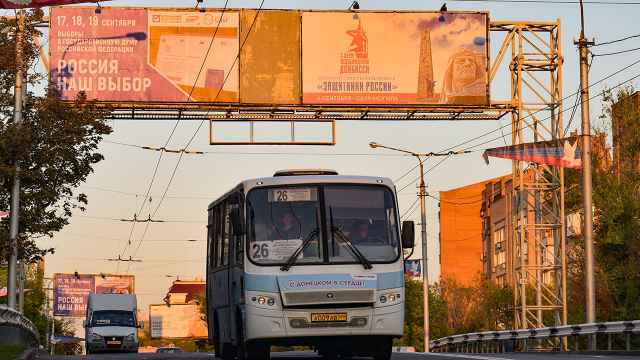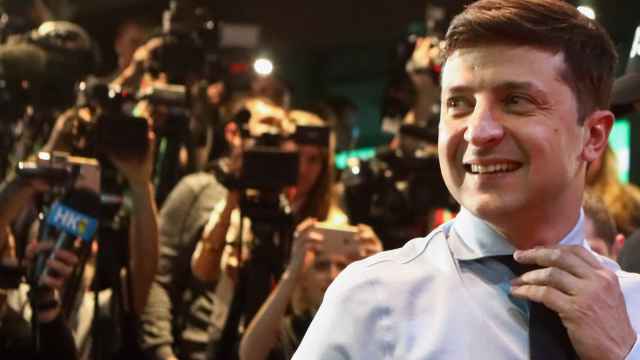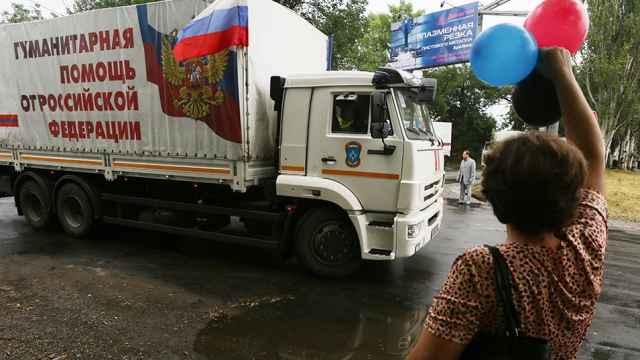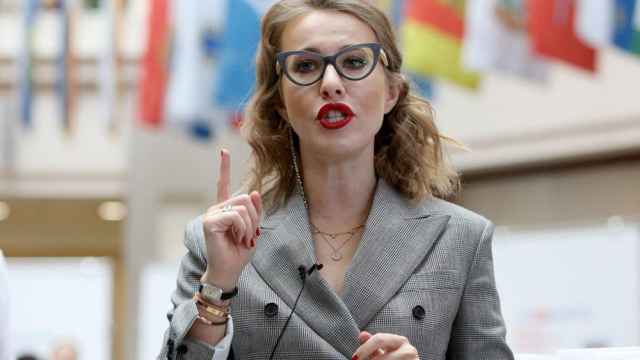The so-called elections on Nov. 11 in the unrecognized “people’s republics” of eastern Ukraine wouldn’t be worthy of discussion if they weren’t further evidence the Kremlin plans to hang on to the territories. In the absence of any international deal he could accept, President Vladimir Putin can only move toward the full recognition of the puppet states, on the model of South Ossetia and Abkhazia.
The elections conferred a questionable legitimacy on Denis Pushilin, leader of the Donetsk People’s Republic, and his counterpart Leonid Pasechnik of the Luhansk People’s Republic. Both were already running the self-proclaimed Donbass statelets. Pushilin acquired power after his predecessor was blown up in a restaurant in August and Pasechnik has been in place since he deposed the previous leader in a bloodless coup a year ago. Both had already been approved by the Kremlin, where Vladislav Surkov, a longtime Putin aide, is in charge of administering the people’s republics. So there was, strictly speaking, no need for the electoral farce.
The show vote took place, nonetheless. Official Russian agencies reported an 80 percent turnout and overwhelming support for the Kremlin’s candidates. “The progress of the election campaign and the unprecedented turnout have shown a high level of popular support for the direction chosen by the republics’ authorities in 2014,” Alexey Chesnakov, a commentator close to Surkov, said to the state-owned TASS news agency. “Kiev should stop wasting precious time and start a direct dialog with Donbass.”
But the election marks a return to this message after exploring a different solution. In April, Kurt Volker, the U.S. special envoy for eastern Ukraine, pinned a tweet that said, “The U.S. remains ready to help negotiate peace for all Ukrainian citizens — but still waiting for a serious Russian response to January proposals.” Those proposals concerned a United Nations peacekeeping mission in eastern Ukraine that would keep Ukrainian troops and Russian proxies from fighting and seal the Russian border with the so-called republics. Surkov promised a prompt answer, but it hasn’t come. Since then, rumors have circulated of various neutral countries offering soldiers for the force, but the Kremlin appears to have cooled on the very idea of UN peacekeepers. Putin never really wanted them anywhere except the separation line, and certainly not on the border.
The election essentially tells the world that Russia is moving on from the notion of a peacekeeping force and even from the Minsk agreements of 2014 and 2015, which called for local elections under Ukrainian law. Chesnakov told TASS that the elections didn’t run counter to the Minsk agreements because the republics weren’t subject to them when it came to electing their parliaments and leaders. That, however, is just insulting nitpicking; Elections by the republics merely confirm that no Ukrainian ones will be held in the near future, otherwise the votes would be even more redundant than they actually were.
The other leaders involved in the Minsk deal reacted promptly and unequivocally. Ukrainian President Petro Poroshenko, German Chancellor Angela Merkel and French President Emmanuel Macron condemned the elections in a joint statement. Volker, for his part, tweeted that Russia was violating the Minsk agreement and added:
In fact, the people of eastern Ukraine would probably be better off with any clear outcome, including absorption into Russia, than with the status quo of living in “countries” no one recognizes.
According to the “official” statistics, there are still a total of 3.7 million people living in the would-be republics. Although this is probably an exaggerated number, it’s safe to say that millions haven’t moved to either Ukraine or Russia in the four years of near-lawlessness and arm’s-length Kremlin rule. There isn’t much work for them in the statelets. Much of the heavy industry, which used to provide about 15 percent of Ukraine’s economic output, is stalled because the factories are in ruins, the equipment has been broken or stolen and Russia — pretty much the only market open to its products — doesn’t need them.
Last year, the republics nationalized the industrial companies, which have since been handed over to a firm called Vneshtorgservis, registered in South Ossetia (that way, it can officially trade with Russia). The company has links to Sergey Kurchenko, an exiled Ukrainian oligarch; it has little interest in keeping any businesses going except the coal mines: There’s a reliable demand for coal. Although the statelets report fast economic growth, they offer no absolute numbers. The official justification is that Ukraine has to be kept in the dark about the economic situation in the territories, but the real reason is that actual numbers would allow anyone with a calculator to divide the amount of Russian aid, a closely kept secret.
Volker is right about Russian taxpayers being on the hook. South Ossetia, a region of 54,000 people that is considered part of Georgia by almost the entire world, but is recognized by Russia as independent, receives about 6 billion rubles ($89 million) a year from Moscow; eastern Ukraine, with its much bigger population, must be far costlier. And yet the elections suggest that Putin is leaning toward a South Ossetian scenario for eastern Ukraine.
The only reason the Kremlin hasn’t recognized the statelets is that Putin finds it hard to admit the failure of his earlier plans to use eastern Ukraine as a bargaining chip in a deal with the U.S. and its Western allies that would involve handing back Donbass to Ukraine in exchange for recognition of the Crimea land grab. No such agreement seems forthcoming, and even Ukraine’s 2019 presidential election offers Putin no chance to trade eastern Ukraine for anything useful: Voters reject any kind of compromise with Moscow. This means the Russian dictator must resign himself to institutionalizing the statelets and making sure people there can survive the long haul. The manipulated elections are a reluctant step in that direction as much as a signal to Western powers that Putin will only negotiate on his own terms.
Leonid Bershidsky is a Bloomberg Opinion columnist covering European politics and business. He was the founding editor of the Russian business daily Vedomosti and founded the opinion website Slon.ru. The views expressed in opinion pieces do not necessarily reflect the editorial position of The Moscow Times.
A Message from The Moscow Times:
Dear readers,
We are facing unprecedented challenges. Russia's Prosecutor General's Office has designated The Moscow Times as an "undesirable" organization, criminalizing our work and putting our staff at risk of prosecution. This follows our earlier unjust labeling as a "foreign agent."
These actions are direct attempts to silence independent journalism in Russia. The authorities claim our work "discredits the decisions of the Russian leadership." We see things differently: we strive to provide accurate, unbiased reporting on Russia.
We, the journalists of The Moscow Times, refuse to be silenced. But to continue our work, we need your help.
Your support, no matter how small, makes a world of difference. If you can, please support us monthly starting from just $2. It's quick to set up, and every contribution makes a significant impact.
By supporting The Moscow Times, you're defending open, independent journalism in the face of repression. Thank you for standing with us.
Remind me later.



